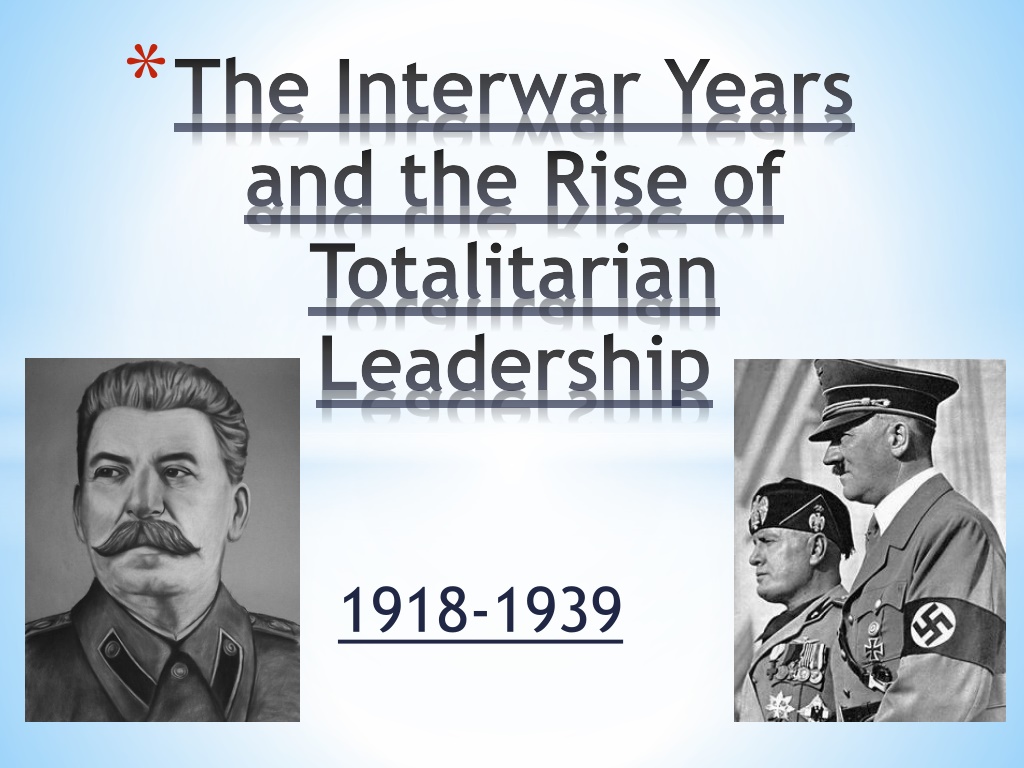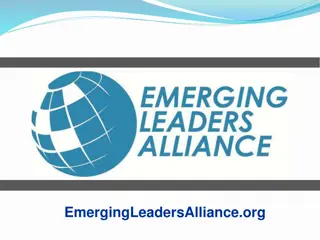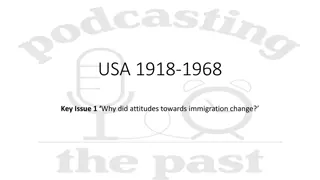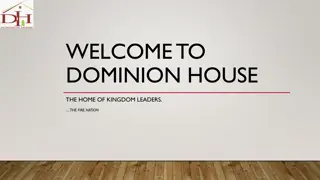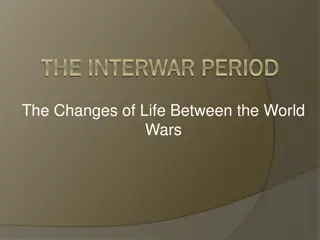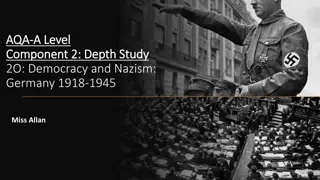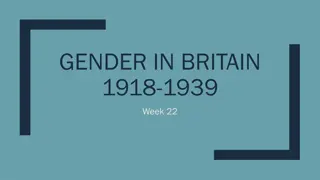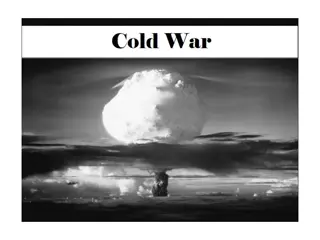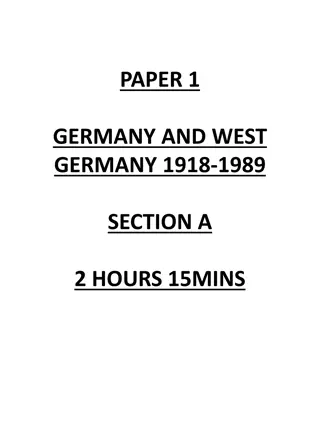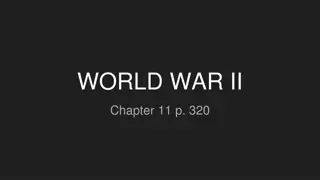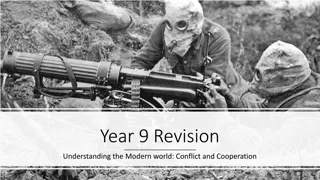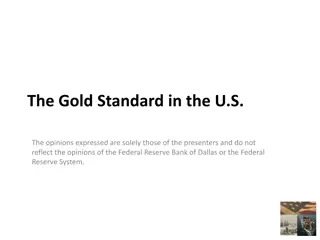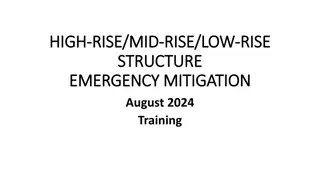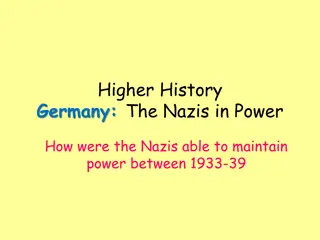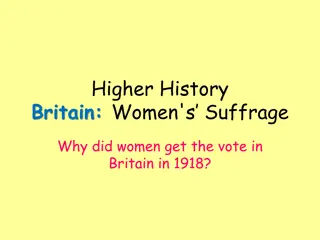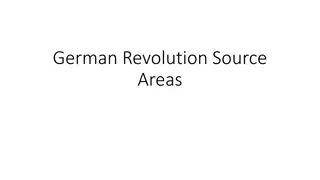The Interwar Years: Rise of Totalitarian Leaders & Global Impact (1918-1939)
Explore the significant events of the Interwar Years, including Woodrow Wilson's 14 Point Plan, the Treaty of Versailles, the League of Nations, punishments imposed on Germany, US involvement post-WWI, and the impact of the Great Depression on global economy.
Download Presentation

Please find below an Image/Link to download the presentation.
The content on the website is provided AS IS for your information and personal use only. It may not be sold, licensed, or shared on other websites without obtaining consent from the author. Download presentation by click this link. If you encounter any issues during the download, it is possible that the publisher has removed the file from their server.
E N D
Presentation Transcript
*The Interwar Years and the Rise of Totalitarian Leadership 1918-1939
*Name the US president who served during World War I and was known for his 14 Point Plan, which tried to bring stability to post war Europe. *Woodrow Wilson *Review
*Name the treaty that severely punished Germany at the end of World War I *Treaty of Versailles *Did the T of V look anything like Wilson s 14 Point plan? *Review
*What global organization was created as part of the T of V which was also proposed by Wilson in his 14 Point plan? *League of Nations *What was the purpose of this organization? *Review
*Name 3 punishments forced onto Germany as part of the T of V. *Reduced army/navy *No U-Boats or air force *Payment for war damages *War Guilt Clause *Loss of Land *Union with Austria forbidden *Review
*Which victorious country in World War I never formally acknowledged the T of V? *United States *What do you think this tells us about the US post World War I? *Kellogg-Briand Pact (1928) *Review
*The United States *What did WWI do for the US in terms of how countries around the globe viewed us? *Vaulted us into a world power *How can we define American lifestyle during the 1920s? *The Roaring 20s *The Interwar Years (1918-1939)
*America became an isolated country in an attempt to fix our own economic problems *The United States *How did the Great Depression in the US effect the rest of the world? *Smoot-Hawley Tariff *Lack of support by the US causes European countries to struggle economically *The Interwar Years (1918-1939)
Troops killed or wounded WWI (1914-1918) 7 In Millions 6 Russia Britain France Italy Germany A-H 5 4 3 2 1 0 Countries
*Estimated cost of WWI *Triple Entente and Allies : $125+ Billion *Triple Alliance and Allies : $60+ Billion *Germany : $37 Billion (Highest of any country) *German reparations Approx. $402 billion in today s $$ (Last payment made Oct. 2010) *Effects of WWI in Europe
*Exchange of Land *Penalties placed on Germany, A-H, Ottoman Empire, and other losing countries results in a massive European facelift *New countries like Poland, Czechoslovakia, Yugoslavia, Estonia, Latvia, Lithuania, among others formed *Effects of WWI in Europe
*Changes in leadership in Germany *1st Reich : King William I and William II *Overthrown as part of T of V *2nd Reich : Weimar Republic *Gov t created as part of T of V *Many Germans viewed the WR as traitors for agreeing to sign the treaty *Effects of WWI in Europe
*Europe did not experience a Roaring 20s like the US *Why? *Germany weakened by T of V, new gov t, forced to pay reparations *France rebuilding after trench warfare *Italy weak gov t, Communist movement *England Isolation b/c of fear of war *Russia Isolation under new Communist leadership *Global Depression
*When the US economy collapse in 1929 what little international money that was coming to Euro countries stopped *Euro countries depressions occurred (France, England) or worsened (Italy, Germany) as a result *France, England, Italy : 20%+ unemployment *Germany : 30%+ and extreme inflation *Global Depression
*Totalitarianism *Theory of government in which a single party or leader controls all aspects of life *Dictator: strong leader with total power *One party: ruling party is the only legal political party *Strict government control of all aspects of life *business, religion, the arts, education, etc. *use of propaganda, censorship, terror, and secret police to control people *Individuals have very few freedoms *No freedom of speech, religion, press, etc. *The Rise of Totalitarian Governments
*Ideas? *In return for *Absolute power *Strong military *More land *People wanted strong leaders to get them out of the Great Depression *Nationalism they promised recovery and to make their countries powerful *Why Turn To Totalitarian Leaders?
*Fascism *Extreme Nationalism *Charismatic Leader *Anti-Communism *Strong military *Military expansion to spread ideas *Communism *No social classes or private property *Anti-Religion *Strong government control *Types of Totalitarian Systems
*How could the Global Depression and the post- WWI environment lead to the rise of totalitarian leaders in Europe? *Question
*Military dictatorship *Collectivization *5 year plans *Aryan Race *Military expansion *Government ownership of property *Anti-Communism *Rebuild Economy *Strengthen Military *Rid of American and European Influence *Prison camps for opposition *Terms to Consider
